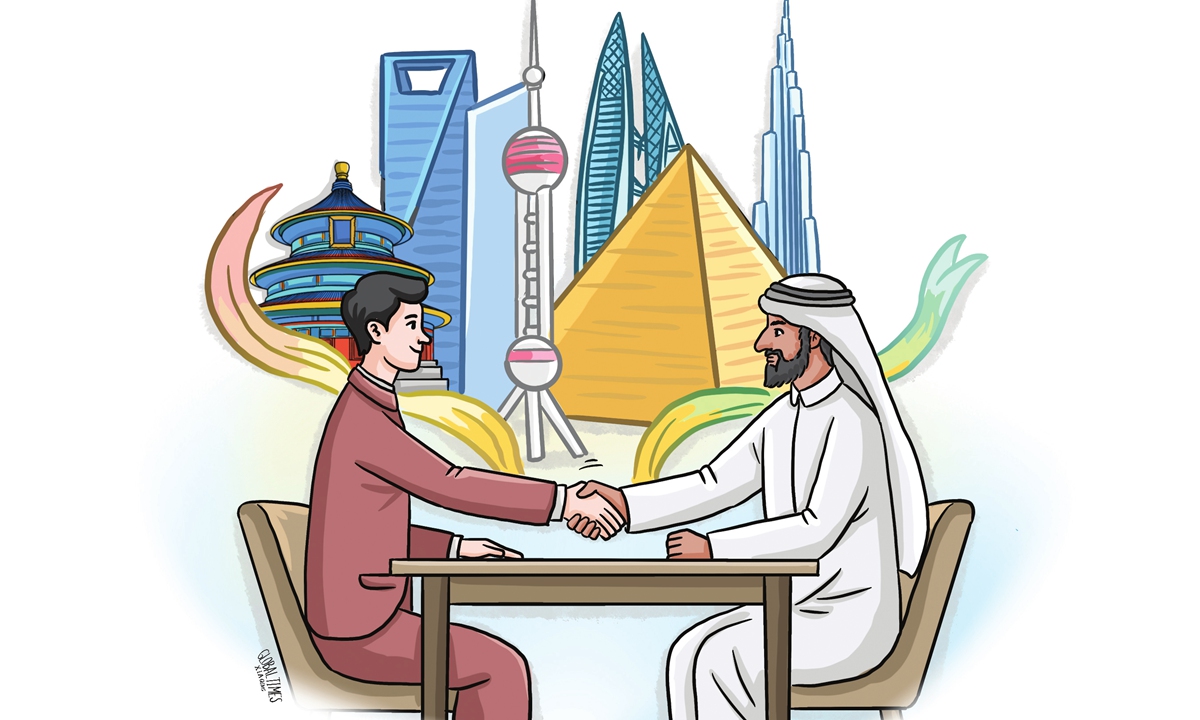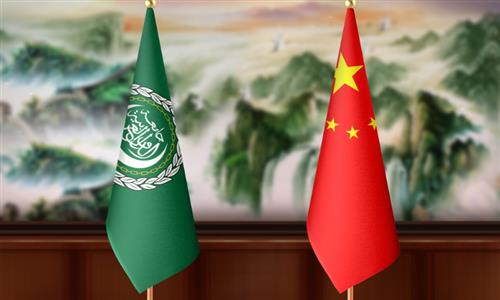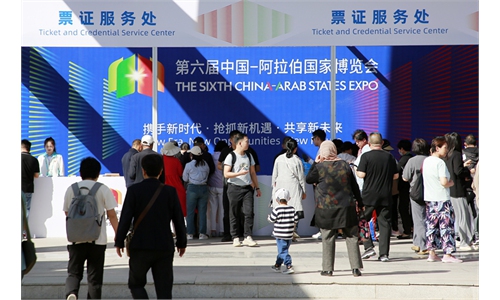
Illustration: Xia Qing/GT
The 10th Ministerial Conference of the China-Arab States Cooperation Forum being held this week in Beijing is particularly important this year. The delivery of a speech at the inauguration by President Xi Jinping and the participation of four invited Arab heads of state illustrate the importance of this meeting for two reasons.
First, the forum, a multilateral framework for China-Arab relations, confirms the deepening of discussions between China and the League of Arab States. The holding of the forum highlights the willingness of the two sides to consolidate their ties.
The forum is only one of several initiatives, multilateral forums and bilateral dialogues between China and Arab states. In the last two decades, both China and the Arab States have worked intensely to strengthen their cooperation in different fields, as laid out in China's Arab Policy Paper published in 2016 or the "1+2+3" cooperation pattern launched in 2014, a proposal for a comprehensive cooperation strategy between China and the Arab states.
To that effect, China has established strategic partnerships with a number of Arab states. Unsurprisingly, the China-Middle East trade volume almost doubled from $262.5 billion to $507.2 billion over the 2017-22 period. The region was the fastest rising trade partner to China in 2022. The emergence of China as an economic powerhouse has enticed many Arab states to diversify their economic partnerships and thus reduce their dependence on hegemonic powers. Most Arab states have adhered to the China-proposed Belt and Road Initiative. Last year, Egypt, Saudi Arabia and the UAE joined BRICS, an adherence that might increase cooperation and perhaps contribute to a newer, fairer mode of global governance.
There is ample room for expanding China-Arab economic relations. While there have been considerable investments in the region, the Arabs states expect more investment in the areas where China has a recognized expertise like artificial intelligence, solar energy and other green energies, big data, and 5G. Except for the rich Gulf states, the rest of the Arab countries are in dire need of more investment in infrastructure and other sectors (highways, dams, electric vehicles and mining). The two sides are fully aware that the opportunities are considerable, and the forum might provide some direction as to how to expand cooperation in the various sectors of the Arab economies.
Second, the forum has come at a critical moment, or even a historical moment. Israel's war on Gaza has exacerbated the disenchantment with the US and the Western world in general. The unconditional military and political support extended to Israel by Western countries contrasts with China's position which aligns with most Arab states and their citizens.
Certainly, Gaza and the Palestinian question will dominate the discussions during the forum. Most of the world, the Arab countries in particular, cannot comprehend why the US and many of its allies refuse to force Israel to stop its actions against the Palestinians, mostly women and children. They cannot understand why the US opposes resolutions calling for a ceasefire at the United Nations Security Council.
Arab states certainly appreciate China's incessant calls for an immediate ceasefire and for alleviating the catastrophic humanitarian crisis. The Arab participants in the forum concur with China's calls for an independent Palestinian state (the two-state solution) as the only way out of the perpetual crisis. Opposition to this solution, Israel and its supporters, is the root cause of the conflict.
The Arab states expect China to play a greater role in political and security issues, like it did skillfully in mediating between Saudi Arabia and Iran in normalizing relations. Naturally, they are not so naive as to expect China to fill any vacuum left by the US - if such scenario exists - but they will certainly advance realistic ideas through China-Arab dialogues, designating areas in which China can offer its contribution.
Meanwhile, the Arab states appreciate China's Five Principles of Peaceful Coexistence, of which noninterference in the domestic affairs of other countries is a sacrosanct principle. They also stand by China in terms of China's core concerns.
In addition to the political and economic questions, the Chinese and Arab sides will certainly deepen the dialogue on cultural matters. Both the Chinese and Arab participants will explore ways to promote the learning of each other's language and an understanding of each other's culture. Both language and culture must develop together, along with the exponential growth witnessed in economic relations, to encourage people-to-people relations and understanding. The forum provides an excellent framework to delve further into the cultural foundations that underpin China-Arab states relations.
The author is a non-resident senior fellow at the Middle East Council on Global Affairs, Doha, Qatar. opinion@globaltimes.com.cn


